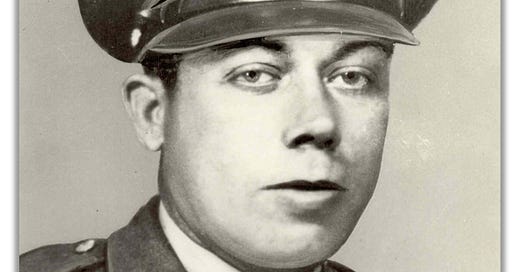On this day in 1944, a hero engages in an action that would earn him the Medal of Honor. Troy McGill single-handedly protected a crucial airstrip in the Pacific just when it was needed most.
“He was Knoxville’s own,” Tennessee journalist Kaye Veal wrote in 1985, “and he died, fighting to the end, slinging his rifle like a club at the oncoming wave of Japanese soldiers when he no longer had bullets to fire.”
McGill’s heroism came as Allied forces began an effort to capture the Admiralty Islands. U.S. forces had opened the campaign with an invasion of Los Negros Island on February 29.
Our soldiers captured the island’s Momote airstrip relatively quickly, but the fight to take the rest of the island took longer. Would Americans have been able to maintain their hold on the airstrip without McGill? Perhaps not.
During the early morning hours of March 4, Sergeant McGill was with his squad of 8 men: They’d been ordered to defend a line of foxholes near the airstrip. The enemy was just 35 yards in front of them.
Unfortunately, the enemy attacked at 4:00 a.m. There were 200 of them—and they were drunk! They screamed threats and curses at our soldiers as they abruptly emerged from the underbrush. Six of the eight Americans were killed. Only McGill and one other remained.
McGill ordered the other soldier to retreat. He planned to hold the line on his own.
“Courageously resolved to hold his position at all costs,” his Medal citation later described, “he fired his weapon until it ceased to function. Then, with the enemy only five yards away, he charged from his foxhole in the face of certain death and clubbed the enemy with his rifle in hand-to-hand combat until he was killed.”
McGill’s body was later found, surrounded by 105 dead enemy. His heroic one-man stand has been credited with saving the vital Momote airstrip.
His sister received the Medal of Honor on his behalf several months later.
“I believe historians have failed to give enough credit to this event and its effects on bringing the war to a quicker conclusion and saving many lives,” Navy veteran Ray Hodges told a Knoxville News-Sentinel reporter. He noted that men like McGill were working to clear a path for those who came to the Pacific at the end of the war. “Few know how much we benefitted from what McGill and his fellow soldiers did,” Hodges concluded. “I do because what they did had a direct impact on my life for the final months of the war.”
Yet another member of the Greatest Generation, giving everything that he had to give—and making a huge difference.
Where would we be but for brave Americans such as these? How proud we can be that we get to call these heroes our own.
Sources can always be found on my website, here.





Wow. Sgt. Troy McGill truly was a one man wrecking crew. He had 105 dead enemy surrounding his own body in the aftermath of the battle? God bless you Sir. God bless all who served as the Greatest Generation and, God bless all who serve or have served to protect this great nation.
Thank you Tara for another MOH Monday.
Reading his story made me cry - He was so brave and made such a difference. He didn't do it for his own glory but to carry out the mission he had been given. I believe that even if he had known it meant certain death he would have done it anyway. We owe many thanks to Sgt. McGill and all like him who defended our country until their last breath.